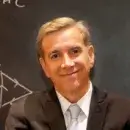
Joseph Incandela
Joseph Incandela, who holds the inaugural Joe and Pat Yzurdiaga Chair in Experimental Science at University of California Santa Barbara, joined the UCSB faculty in 2000 as a professor of physics, after spending a decade at Fermi National Accelerator Laboratory where he played an important role in the discovery of the top quark, the heaviest known elementary particle, in 1995.
For the past two decades, he has been involved with the Large Hadron Collider at the European Organization for Nuclear Research (CERN), initially leading the construction of a large part of the particle tracking system for the Compact Muon Solenoid (CMS) Experiment before joining the team coordinating the physics program in 2007. He was named deputy leader of the experiment in 2010.
In early 2011, Incandela was the first American elected to lead the CMS experiment, with more than 3,000 scientists and engineers from 39 countries. Under his leadership, the collaboration confronted and overcame new challenges associated with record high-intensity proton beams to uncover strong evidence for the highly sought Higgs boson, validating a 50-year-old theory about the nature of the Universe. Incandela announced the CMS discovery of the Higgs boson at CERN on July 4, 2012.
Incandela remains actively involved in the CMS experiment, where his group searches for new elementary particles and processes, and where he plays a leadership role in the design and construction for a technology upgrade of the detector, to be installed around 2026.
He is applying the same technology in a lower-energy experiment he co-proposed to search for dark matter particles in a very promising mass range that has never before been accessible. The dark matter experiment will operate at the SLAC National Accelerator Laboratory at Stanford University.
The recipient of numerous honors and awards, Incandela received the 2013 Special Breakthrough Prize in Fundamental Physics, as well as the 2013 European Physical Society High Energy Physics Prize. He is a member of the National Academy of Sciences and a fellow of both the American Physical Society and the American Association for the Advancement of Science. In 2016 he was selected as the UCSB Faculty Research Lecturer, the highest honor bestowed by the university faculty on one of its members.